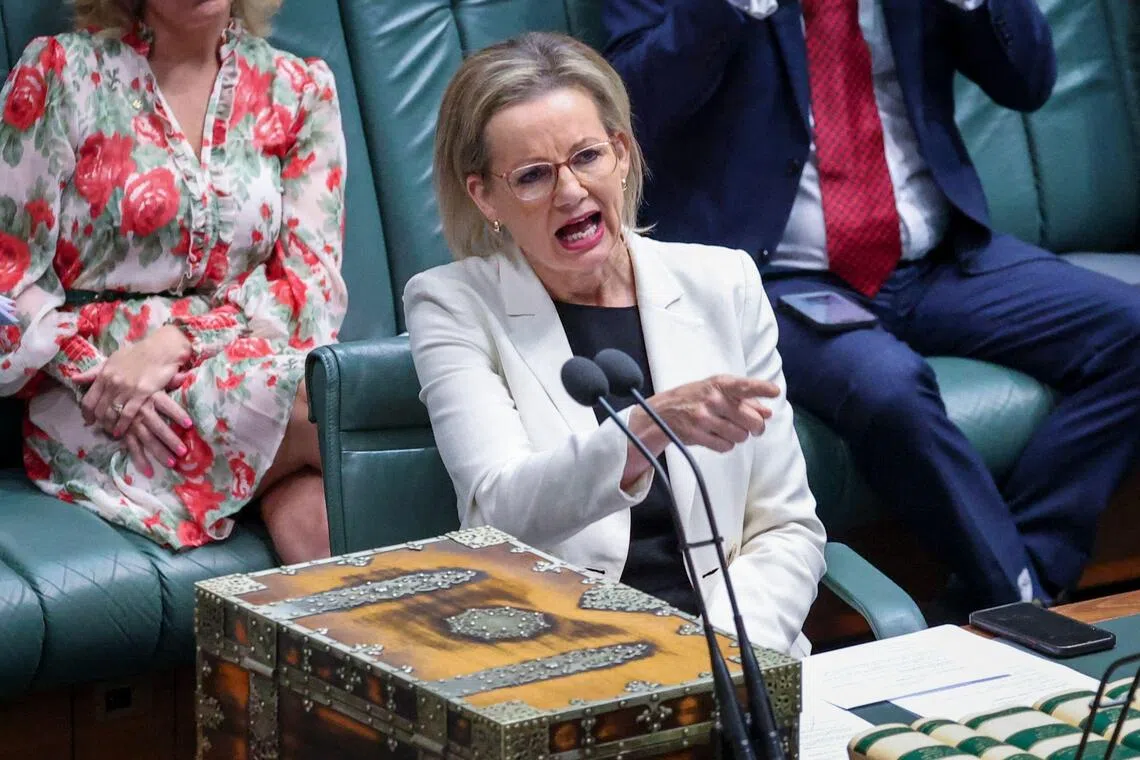Australia’s opposition ditches commitment to net-zero emissions
Sign up now: Get insights on Asia's fast-moving developments

Australia’s Opposition Leader Sussan Ley said her centre-right Liberal Party remained committed to “responding to climate change in a way that is affordable, responsible and achievable”.
PHOTO: AFP
SYDNEY - Australia’s conservative opposition said on Nov 13 it will drop its commitment to achieving net-zero emissions by 2050 if it wins power and leads a country dependent on fossil fuels but highly vulnerable to climate change.
Prime Minister Anthony Albanese’s centre-left government has poured billions into solar power, wind turbines and green manufacturing, and pledged to make Australia a renewable energy superpower.
It has also pledged to slash planet-warming greenhouse gas emissions by up to 70 per cent from 2005 levels over the next decade, and is campaigning to co-host 2026’s UN climate summit alongside Pacific Island neighbours – some of the most climate-threatened nations in the world.
The opposition centre-right Liberal Party has agonised in recent weeks over whether to drop the net-zero emissions pledge, introduced in 2021 by the party’s former leader Scott Morrison when he was prime minister.
After days of closed-door debate with party top brass, opposition leader Sussan Ley said on Nov 13 that her party would drop the goal if it returned to office.
She said it remained committed to “responding to climate change in a way that is affordable, responsible and achievable”.
“Net zero would be welcome”, but the target would have to be achieved without government intervention, Ms Ley added.
“Energy affordability” would instead take precedence over government action to stop climate change, she said.
The Liberals were roundly defeated in 2025’s federal elections
Ms Ley’s announcement comes just days after their conservative coalition partners, the National Party, voted to ditch their net zero by 2050 target.
The two parties will meet on Nov 16 to determine their coalition’s formal stance.
‘Climate wars’ redux
Australia’s “climate wars” – a years-long domestic fight over emissions policy – stalled progress, and the country remains dependent on its fossil fuel economy for growth.
Mr Albanese on Nov 13 slammed the opposition for “walking away from climate action”.
“They’re also walking away from reliable and affordable energy,” he told reporters in Canberra.
But his green ambitions remain at odds with Australia’s deep entanglement with lucrative fossil fuel industries.
It is the world’s second-largest coal exporter, holds the third-largest coal reserves and continues to channel billions of dollars in public subsidies into fossil fuels.
And iron ore, extracted through emissions-intensive mining, remains its most valuable export.
Australia, with its vast flora and fauna, is considered highly vulnerable to climate change.
A landmark climate impact report
Associate Professor James Hopeward at the University of South Australia said the Liberals’ reversal was “a catastrophic failure to acknowledge both climate science and energy system dynamics”.
“Crucially, the Liberal Party’s policy retreat ignores a fundamental truth: The transition to renewable energy is inevitable,” he said.
Australia already has the highest rate of skin cancer in the world – almost 19,000 Australians were estimated to be diagnosed with melanoma in 2024, official health data shows.
Environmentalists fear Nov 13’s move by the Liberals would see them walk back any meaningful progress made in recent years should they get back into office.
Ms Amanda McKenzie, chief executive of the Climate Council non-governmental organisation, said ditching net zero would allow “climate change to rip”.
“It’s deadly negligence that would leave Australians facing more fires, floods and heatwaves,” she said in a statement. “You can’t win elections by ignoring voters who want meaningful climate action.” AFP


